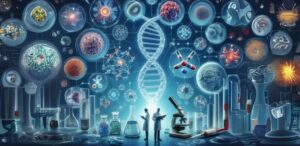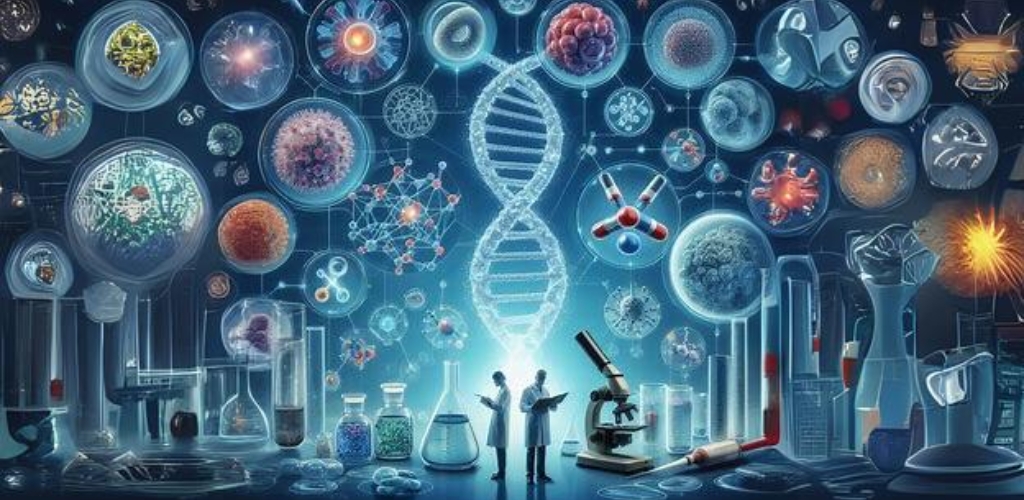
In the ever-evolving landscape of scientific discovery, synthetic biology has emerged as a transformative field that is redefining the boundaries of what is possible in the life sciences. By harnessing the power of genetic engineering and computational tools, synthetic biologists are crafting a new genetic toolkit, one that allows for the precise manipulation of living organisms and the creation of novel biological systems. From revolutionising healthcare to addressing global challenges in agriculture and environmental sustainability, the potential of synthetic biology is truly boundless.
Mastering the Genetic Code:
At the heart of synthetic biology lies the ability to understand and manipulate the fundamental building blocks of life – DNA, the genetic code that defines the characteristics and functions of living organisms. By leveraging our ever-expanding knowledge of genomics, synthetic biologists can create customised genetic sequences and introduce them into living cells, effectively reprogramming their behaviour and capabilities.This process of designing and constructing novel biological systems, or re-engineering existing ones, allows for the precise control of cellular functions. Synthetic biologists can engineer microbes to produce valuable compounds, modify the traits of crops, or even create entirely new life forms tailored to specific purposes.
Transforming the Life Sciences Landscape:
The impact of synthetic biology on the life sciences is far-reaching and profound. In the realm of healthcare, researchers are exploring ways to engineer bacteria or viruses to detect and eliminate cancer cells, deliver targeted therapies, or monitor and maintain overall health. Additionally, synthetic biology has the power to accelerate the development of vaccines and therapeutics, as well as personalized treatments tailored to an individual’s genetic makeup.
Beyond the medical field, synthetic biology is also being leveraged to address global challenges in the agricultural sector. By engineering crops to be more resilient, nutritious, and resistant to pests and diseases, synthetic biologists aim to enhance food security and sustainability. Moreover, the field offers solutions for sustainable energy production, such as the creation of biofuels from engineered microorganisms or the development of self-repairing materials inspired by nature.
Navigating the Ethical Landscape:
As with any transformative technology, synthetic biology raises important ethical considerations that must be carefully navigated. Issues surrounding biosafety, biosecurity, and the potential misuse of engineered organisms require robust governance frameworks and international collaboration.
Researchers, policymakers, and industry leaders must work together to develop clear guidelines and protocols that prioritize public safety, environmental protection, and equitable access to the benefits of synthetic biology. Fostering transparency, promoting public understanding, and empowering individuals to make informed decisions about the use of this technology will be crucial in shaping its responsible development.
Unlocking Life’s Potential:
The future of synthetic biology is one of boundless possibilities, where the very building blocks of life can be harnessed to create a better world. By mastering the art of designing and engineering novel organisms, synthetic biologists have the power to address some of humanity’s most pressing challenges, from curing diseases to ensuring food and energy security.
However, as we embark on this exciting journey, we must remain vigilant to the ethical considerations and potential risks that accompany this pioneering science. Through collaboration, responsible innovation, and a steadfast commitment to sustainability, we can ensure that the development of synthetic biology remains a force for good, shaping a future that is healthier, more equitable, and more resilient for generations to come.
What are the key regulatory challenges in synthetic biology ?
- Biosafety and biosecurity concerns: There are risks around the potential misuse of engineered organisms and the need to prevent accidental release or intentional misuse. Robust containment measures and safety protocols are required.
- Environmental impact assessment: Evaluating the potential ecological effects of engineered organisms is challenging. Rigorous testing is needed to predict and mitigate unintended consequences before real-world deployment.
- Intellectual property and patent issues: Navigating the complex landscape of IP rights and patent claims is difficult, especially for foundational technologies and platform approaches. Balancing innovation incentives with access is an ongoing challenge.
- Dual-use research of concern: Some synthetic biology research has the potential for both beneficial and malicious applications. Determining what research should be restricted or monitored is an ethical minefield.
- Equitable access and benefit sharing: Ensuring the fruits of synthetic biology are distributed fairly and that developing countries can access the technology is an important consideration. Benefit sharing frameworks are needed.
- Public engagement and trust: Maintaining public trust in the technology requires transparency, education, and ongoing dialogue. Perceptions of risk and benefit can vary widely.
- Regulatory uncertainty and gaps: Existing regulatory frameworks were not designed for synthetic biology. Adapting them to provide appropriate oversight without stifling innovation is an ongoing challenge.
Addressing these challenges will require collaboration between researchers, industry, policymakers, and the public to develop robust yet flexible governance approaches. Proactive, adaptive, and inclusive regulation will be key to realising the potential of synthetic biology while mitigating risks.
Conclusion:
As we delve deeper into the captivating realm of synthetic biology, it becomes increasingly clear that this transformative field holds the key to unlocking life’s potential and revolutionising the life sciences. By crafting a new genetic toolkit that allows for the precise manipulation of living organisms, synthetic biologists are paving the way for groundbreaking advancements in healthcare, agriculture, and environmental sustainability.
However, the journey ahead is not without its challenges. Addressing issues surrounding biosafety, biosecurity, and the potential misuse of engineered organisms will require robust governance frameworks and international collaboration. By working together and staying true to our values, we can ensure that the benefits of synthetic biology are realised in a manner that prioritises public safety and environmental protection.
In conclusion, synthetic biology represents a transformative leap in our understanding and manipulation of life itself. By crafting a new genetic toolkit and unlocking life’s potential, we have the power to revolutionise the life sciences and create a better future for all. As we continue to push the boundaries of what is possible, let us do so with a steadfast commitment to responsible innovation and a deep respect for the complexities of the natural world. Together, we can harness the power of synthetic biology to shape a world that is healthier, more sustainable, and more equitable for generations to come.
Citations:
[1] https://www.frontiersin.org/research-topics/27430/insights-in-synthetic-biology-2021-novel-developments-current-challenges-and-future-perspectives/magazine
[2] https://www.startus-insights.com/innovators-guide/synthetic-biology-trends/
[3] https://royalsociety.org/news-resources/projects/synthetic-biology/
[4] https://en.wikipedia.org/wiki/Synthetic_biology
[5] https://www.ncbi.nlm.nih.gov/pmc/articles/PMC8578974/




